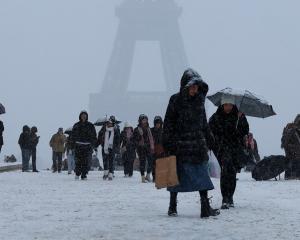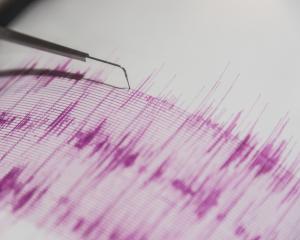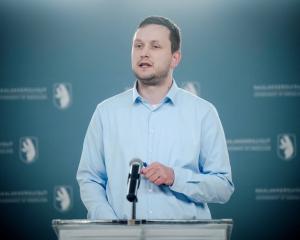The extent of the damage and lawlessness that has struck Haiti in the wake of last week's earthquake is no surprise to a Dunedin policeman who spent six weeks in the island nation establishing communications networks for Red Cross following the devastating hurricanes in 2008.
As he prepared yesterday to leave for a six-month stint as head of security for the International Federation of Red Cross in Sri Lanka, Senior Constable Niall Shepherd said the more one knew about those sorts of situations "the more mind-bogglingly enormous the scale of [the Haiti disaster] is". Snr Const Shepherd, a Dunedin community constable, has previously spent five months in the Solomon Islands, nine months in East Timor (both stints with the police) and six weeks in Haiti with the Red Cross.
Before the earthquake, Haiti already had substandard infrastructure and buildings and struggled with law and order because of a lack of governance and regulations, combined with generations of corruption and unscrupulous operators, he said.
It was hard to compare the scale of last week's earthquake with the 2004 Boxing Day tsunami as the Asian countries affected had sound infrastructures, meaning aid could be distributed with relative ease.
The same could not be said of Haiti.
There were no building regulations to speak of and buildings had been constructed by people so poor, good practices were scant.
For example, builders were known to mix one part cement with 10 parts sand instead of five parts sand, and buildings were reinforced with smooth steel.
"So if [the steel] is bent, the concrete will just slide off.
"It's a hilly city and the shanty towns were built on top of one another, so they basically just concertina-ed, like dominoes."
The situation was compounded by the dense concentration of people in the city and the lack of basic infrastructure.
"The streets were narrow and now they are blocked and there is no way around.
"Getting aid to those who needed it must be a logistical nightmare, with only one airport operational and the port closed."
It was also unsurprising lawlessness now reigned in Haiti.
Agencies reported yesterday rescue workers could no longer work at night, even though that was the best time for using recovery dogs, for fear of being attacked by looters and gangs.
"Even when we were there, every supermarket and petrol station was protected by guards armed with shotguns, so in the absence of any effective police service, I guess it's just mob rules."
Snr Const Shepherd said there was a possibility he would go to Haiti at some stage of the recovery effort as he expected the operation would take many years.
His posting in Sri Lanka involved arranging and covering any incidents to do with about 20 Red Cross staff in the country.
His arrival in the country this weekend would coincide with the build-up to next week's presidential election, but that was purely coincidental as the Red Cross was a neutral organisation, he said.
The Red Cross was still involved with tsunami relief in Sri Lanka, helping people who had problems with dengue fever and Aids.












